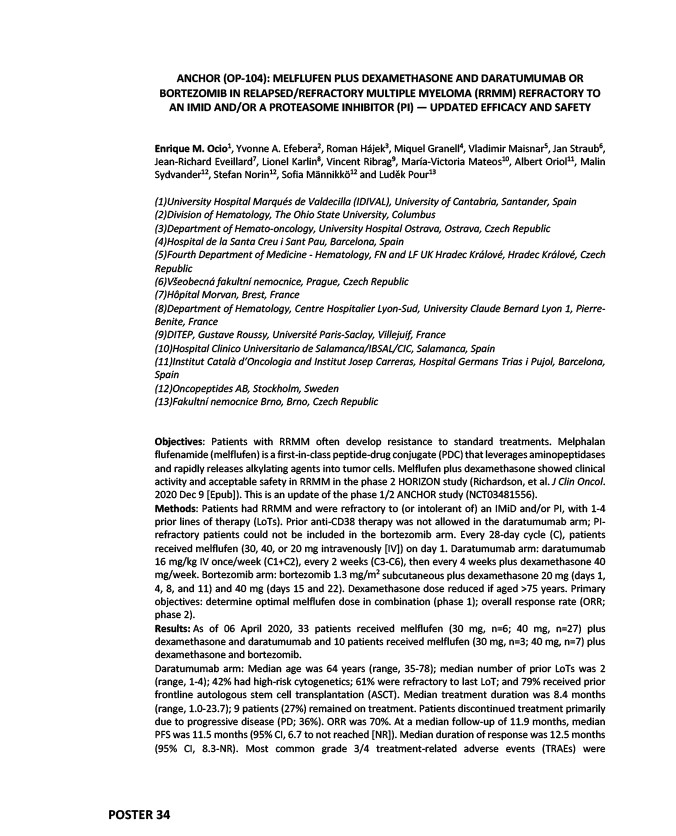
POSTER 34
ANCHOR (OP-104): MELFLUFEN PLUS DEXAMETHASONE AND DARATUMUMAB OR
BORTEZOMIB IN RELAPSED/REFRACTORY MULTIPLE MYELOMA (RRMM) REFRACTORY TO
AN IMID AND/OR A PROTEASOME INHIBITOR (PI) — UPDATED EFFICACY AND SAFETY
Enrique M. Ocio1, Yvonne A. Efebera2, Roman Hájek3, Miquel Granell4, Vladimir Maisnar5, Jan Straub6,
Jean-Richard Eveillard7, Lionel Karlin8, Vincent Ribrag9, María-Victoria Mateos10, Albert Oriol11, Malin
Sydvander12, Stefan Norin12, Sofia Männikkö12 and Luděk Pour13
(1)University Hospital Marqués de Valdecilla (IDIVAL), University of Cantabria, Santander, Spain
(2)Division of Hematology, The Ohio State University, Columbus
(3)Department of Hemato-oncology, University Hospital Ostrava, Ostrava, Czech Republic
(4)Hospital de la Santa Creu i Sant Pau, Barcelona, Spain
(5)Fourth Department of Medicine - Hematology, FN and LF UK Hradec Králové, Hradec Králové, Czech
Republic
(6)Všeobecná fakultní nemocnice, Prague, Czech Republic
(7)Hôpital Morvan, Brest, France
(8)Department of Hematology, Centre Hospitalier Lyon-Sud, University Claude Bernard Lyon 1, Pierre-
Benite, France
(9)DITEP, Gustave Roussy, Université Paris-Saclay, Villejuif, France
(10)Hospital Clinico Universitario de Salamanca/IBSAL/CIC, Salamanca, Spain
(11)Institut Català d’Oncologia and Institut Josep Carreras, Hospital Germans Trias i Pujol, Barcelona,
Spain
(12)Oncopeptides AB, Stockholm, Sweden
(13)Fakultní nemocnice Brno, Brno, Czech Republic
Objectives: Patients with RRMM often develop resistance to standard treatments. Melphalan
flufenamide (melflufen) is a first-in-class peptide-drug conjugate (PDC) that leverages aminopeptidases
and rapidly releases alkylating agents into tumor cells. Melflufen plus dexamethasone showed clinical
activity and acceptable safety in RRMM in the phase 2 HORIZON study (Richardson, et al. J Clin Oncol.
2020 Dec 9 Epub). This is an update of the phase 1/2 ANCHOR study (NCT03481556).
Methods: Patients had RRMM and were refractory to (or intolerant of) an IMiD and/or PI, with 1-4
prior lines of therapy (LoTs). Prior anti-CD38 therapy was not allowed in the daratumumab arm; PI-refractory
patients could not be included in the bortezomib arm. Every 28-day cycle (C), patients
received melflufen (30, 40, or 20 mg intravenously IV) on day 1. Daratumumab arm: daratumumab
16 mg/kg IV once/week (C1+C2), every 2 weeks (C3-C6), then every 4 weeks plus dexamethasone 40
mg/week. Bortezomib arm: bortezomib 1.3 mg/m2 subcutaneous plus dexamethasone 20 mg (days 1,
4, 8, and 11) and 40 mg (days 15 and 22). Dexamethasone dose reduced if aged >75 years. Primary
objectives: determine optimal melflufen dose in combination (phase 1); overall response rate (ORR;
phase 2).
Results: As of 06 April 2020, 33 patients received melflufen (30 mg, n=6; 40 mg, n=27) plus
dexamethasone and daratumumab and 10 patients received melflufen (30 mg, n=3; 40 mg, n=7) plus
dexamethasone and bortezomib.
Daratumumab arm: Median age was 64 years (range, 35-78); median number of prior LoTs was 2
(range, 1-4); 42% had high-risk cytogenetics; 61% were refractory to last LoT; and 79% received prior
frontline autologous stem cell transplantation (ASCT). Median treatment duration was 8.4 months
(range, 1.0-23.7); 9 patients (27%) remained on treatment. Patients discontinued treatment primarily
due to progressive disease (PD; 36%). ORR was 70%. At a median follow-up of 11.9 months, median
PFS was 11.5 months (95% CI, 6.7 to not reached NR). Median duration of response was 12.5 months
(95% CI, 8.3-NR). Most common grade 3/4 treatment-related adverse events (TRAEs) were